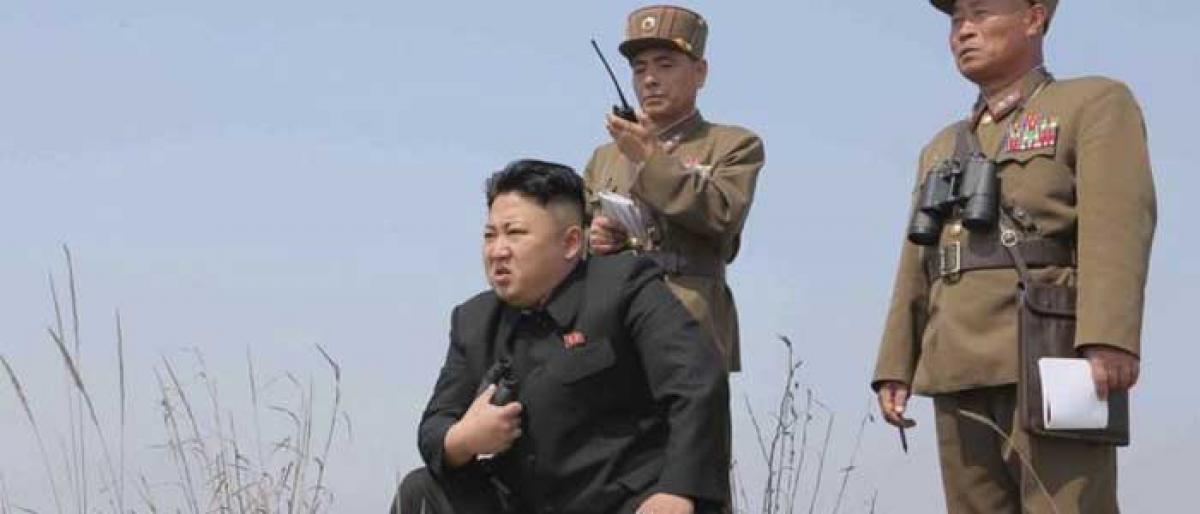Live
- Jharkhand: After see-saw battle, INDIA bloc takes big lead against NDA in early trends
- Konda Surekha directs officials to focus on eco-tourism devpt in a scientific manner
- Assam bypolls: BJP and its allies leading on all five seats
- Applicants squirm as 5 cams conk out at Uppal RTA office
- Flawless Execution: Driver Tenure Solution Achieves Two Years of Zero Production Incidents
- TGBIE extends scholarship deadline to Nov 30
- Leading Data Analytics Expert Boosts Financial Services with Advanced Reports and Dashboards for Hedging and Asset Allocation
- 26 Young India Integrated Resi Schools to come up in State
- BGT 2024-25: Bumrah picks five as India take 46-run lead after bowling out Australia for 104
- Thrilling experience: KV students extract DNA from bananas
Just In

The North Korea successfully testing what is being described as a hydrogen bomb that can be mounted on an Inter-Continental Ballistic Missile (ICBM) has alarmed the global community. The Pyongyang new nuclear initiative despite American President warning of “fire and fury” clearly indicates the strategic masterstroke by the North Korean leadership.
The North Korea successfully testing what is being described as a hydrogen bomb that can be mounted on an Inter-Continental Ballistic Missile (ICBM) has alarmed the global community. The Pyongyang new nuclear initiative despite American President warning of “fire and fury” clearly indicates the strategic masterstroke by the North Korean leadership.
Mere unilateral condemnation of North Korean latest nuclear test will not in any way contribute to the process of diffusing the enveloping crisis.
The international community should find the reasons for such a hawkish behaviour from North Korea and address the same to the satisfaction of all concerned if it wants a meaningful solution to the emerging problem.
India whose nuclear policy is wedded to minimum credible nuclear deterrence cannot also join the chorus of such one-sided protests led by the West. Rather it should contribute to the efforts to find a reasonable solution to the Korean impasse.
South Korean government’s decision to install American surface-to-air Terminal High-Altitude Area Defense (THAAD) system on its territory angered China, Russia and North Korea. The growing nexus among United States, South Korea and Japan alters the balance of power in the region.
However, South Korea argues that the deployment of THAAD missile system is to deter possible missile attacks from its Northern counterpart. Both the US and South Korea should realise that Beijing’s cooperation is an imperative to solve the North Korean missile crisis.
Meanwhile, the Trump administration is reportedly mooting a regime change in Pyongyang through military intervention. Such operations have destabilised the West Asia and the North African regions. Any such plans obviously infuriate North Korean regime.
In fact, Obama administration reportedly carried out a cyber and electronic strike targeting North Korean missile programme (March 4, 2017, New York Times). Yet, the Washington could not contain North Korean advances in missile technology, especially its ICBM. On the other, North Korea retaliated by hacking Sony Pictures indicating its cyber warfare capabilities.
The offensive joint annual military exercises by United States and South Korea have further emboldened North Korea. It claims that its nuclear tests are self-defensive measures against what they call the growing military bellicose attitude of US and its allies towards it. But, Washington calls Pyongyang a world menace. The international community led by United Nations can attempt a reasonable solution to the problem only by independently checking the veracity of the arguments put out by both sides rather than unilaterally deploring North Korea.
Such an autarchic attitude by the global powers failed so far to dissuade North Korea. Today, whether one likes or not, North Korea is a de facto nuclear power. More economic sanctions would only further aggravate this situation. Instead, the United States can initiate direct negotiations or under the aegis of UN to address the concerns of North Korea. Massive aid, lifting of sanctions, de-escalating the military engagement by outside powers in the region, and international guarantee to the sovereignty of North Korea can prove to be productive in resolving the tension.

© 2024 Hyderabad Media House Limited/The Hans India. All rights reserved. Powered by hocalwire.com







